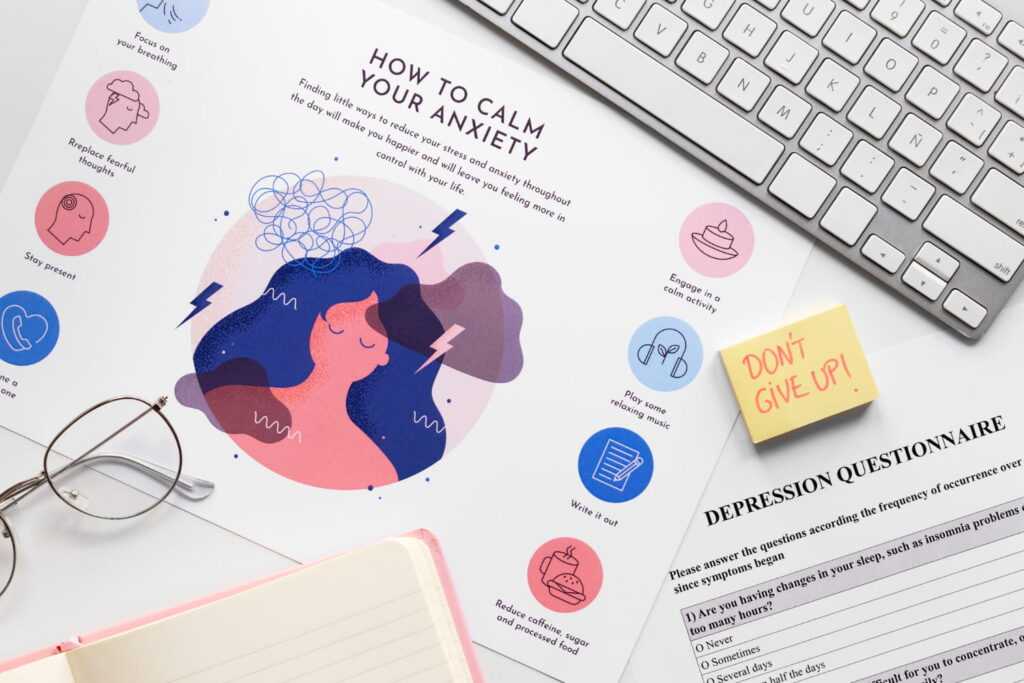Clinical Psychologist Vs Psychologist: How Are They Different?
The main difference between a clinical psychologist and a general psychologist lies in their specialized training and scope of practice. While both require doctoral degrees and state licensure, clinical psychologists complete an additional 2+ years of specialized training in diagnosing and treating severe mental illnesses.
Key differences include:
- Education: General psychologists need a doctoral degree (Ph.D. or Psy.D.) plus supervised experience. Clinical psychologists require the same foundation plus specialized clinical training through APA-accredited programs and additional supervised clinical hours.
- Scope of Practice: General psychologists help with everyday concerns like stress, relationship issues, and life transitions. Clinical psychologists specialize in complex mental health conditions including bipolar disorder, schizophrenia, PTSD, and personality disorders.
- Treatment Focus: General psychologists provide counseling and therapy services for common mental health challenges. Clinical psychologists conduct comprehensive psychological assessments, provide diagnoses, and deliver specialized treatment for severe or treatment-resistant conditions.
Neither type of psychologist can prescribe medication in most states, this requires a psychiatrist or medical doctor. Both work collaboratively with other healthcare providers to support comprehensive treatment plans.

At-a-glance overview
Here’s a snapshot of the key commonalities and distinctions between these two professions. We’ll explore each of these points more thoroughly in the subsequent sections.
| Category | Psychologist | Clinical psychologist |
|---|---|---|
| Educational requirements | At least 6 years of education: Bachelor’s degree in psychology (4 years) plus 2 years of supervised practical experience | At least 8 years of education: Advanced degree (Master’s or PhD) in Clinical Psychology following initial psychologist qualifications |
| Practice area | Broad mental wellness assistance and behavioral concerns | Expert-level diagnosis and treatment of severe psychological conditions and mental illnesses |
| Primary focus areas | Everyday stress, mild anxiety, sadness, workplace challenges, interpersonal difficulties, etc. | Clinical anxiety conditions, major depression, manic-depressive illness, psychotic disorders, etc. |
| Work environments | Educational institutions, corporate settings, public health centers, independent practice | Hospital settings, psychiatric facilities, specialty mental health centers, private clinics |
| Medication authority? | No | No |

Who Are General Psychologists and What Do They Do?
All psychologists in the United States must be licensed by their state’s board of psychology and adhere to professional standards established by the American Psychological Association (APA) and state regulatory bodies.
To become a licensed psychologist, individuals must:
- Complete a doctoral degree in psychology (Ph.D. or Psy.D.) from an accredited program
- Complete supervised clinical experience (typically 1-2 years or 1,500-4,000 hours)
- Pass the Examination for Professional Practice in Psychology (EPPP)
- Meet continuing education requirements annually
General psychologists represent the largest segment of mental health practitioners in the profession. They provide services across various settings including private practice for individuals, couples, and family therapy; corporate wellness and organizational consulting; and school and community mental health centers.
They’re trained to address a wide spectrum of concerns, including stress management, anxiety, interpersonal difficulties, and challenges with developing or sustaining positive behavioral patterns. General psychologists maintain a broad clinical focus rather than specializing in one area, which allows them exceptional flexibility in their practice.

What Clinical Psychologists Do and How They Help
A clinical psychologist has the same foundational training as a general psychologist, but they pursue additional specialized education. Beyond their undergraduate degree, they must complete a doctoral program—either a Ph.D. or Psy.D. in Clinical Psychology—from an APA-accredited institution and fulfill a one-year predoctoral internship plus postdoctoral supervised experience. They are also required to participate in ongoing professional development and continuing education.
This comprehensive training encompasses severe mental illness and persistent psychological conditions; psychological assessments, diagnostic testing, and evaluation reports; and research-based treatment strategies.
They often work with people who experience:
- Chronic or treatment-resistant depression
- Bipolar disorder or psychotic conditions
- Post-traumatic stress disorder (PTSD)
- Personality disorders or complex trauma

Other types of psychologists?
Yes. In the United States, licensed psychologists may pursue specialized training and board certification in specific practice areas, which demonstrate advanced competencies and supervised experience. Common specializations besides Clinical Psychology include:
- Counseling psychology – Focused on relationship difficulties, life transitions, and building emotional well-being
- School and developmental psychology – Supports children, adolescents, parents, and caregivers with concerns related to identity development, child behavior and growth, and learning challenges
- Forensic psychology – Integrates psychological expertise within judicial and criminal justice settings through specialized forensic evaluations
- Health psychology – Assists individuals in coping with medical diagnoses, persistent pain, and the mental health aspects of physical conditions
- Organizational psychology – Addresses workplace dynamics, executive development, and employee mental health and performance
- Neuropsychology – Specializes in brain function through neuropsychological evaluations for conditions affecting cognitive abilities
Aside from psychologists, there are other mental health professionals you can choose from, including counselors, psychotherapists, and clinical social workers.

Are psychologists able to prescribe medication?
In most states, no. While able to provide diagnoses and treatment recommendations, psychologists typically cannot prescribe medication. This is usually done by psychiatrists, primary care physicians, or other medical doctors.
However, in a few states (New Mexico, Louisiana, Illinois, Iowa, and Idaho), specially trained psychologists with prescriptive authority can prescribe psychiatric medications after completing additional education and certification requirements approved by the state board of psychology.
Psychologists frequently collaborate with prescribing providers to coordinate comprehensive treatment plans. This collaborative approach ensures patients receive both therapeutic support and appropriate medication management when needed.
Is a clinical psychologist superior to a general psychologist?
Not necessarily. The effectiveness and quality of psychological treatment aren’t solely based on educational credentials. Whether a practitioner is a clinical or general psychologist should be just one factor among many when selecting the mental health professional who’s the best match for your needs.
Consider a clinical psychologist if:
- You’re managing severe or chronic mental health disorders as defined by the National Institute of Mental Health
- You need comprehensive psychological testing or diagnostic evaluations
- Previous therapeutic approaches haven’t been effective, and you require a more specialized treatment plan
A general psychologist might be right for you if:
- You’re beginning your therapy journey and facing common life stressors or emotional challenges
- You’re seeking support with personal development, interpersonal skills, or habit modification through approaches like cognitive behavioral therapy
- You prefer accessible, budget-friendly counseling services
There may be no inherent benefit or drawback to choosing a general psychologist over a clinical psychologist. The practitioner who will best serve your needs is someone with expertise in your specific area of concern, someone with whom you feel comfortable and establish rapport, and someone who will be thorough in developing your treatment plan and supporting you through meaningful life changes.

How do I choose the right therapist?
A therapist’s academic credentials represent just one aspect of their qualifications. A helpful guideline for selecting the most suitable psychologist is to look for someone who:
- possesses knowledge and experience in your specific area of need;
- creates a secure and comfortable therapeutic environment;
- demonstrates warmth, kindness, and non-judgmental acceptance; and
- shows genuine empathy and can effectively reflect your emotions and challenges
It can also help to ask yourself a few practical questions: What kind of help am I looking for at this time? Do I need general counseling or specialized treatment for a particular condition? What are my financial constraints and insurance coverage preferences? Organizations like NAMI offer resources to help guide your decision-making process.
Conclusion
Understanding the difference between general and clinical psychologists empowers you to make informed decisions about your mental health care. While clinical psychologists specialize in severe mental health conditions and complex diagnoses, general psychologists excel at helping with life’s everyday challenges and personal growth. Remember, the “best” therapist isn’t determined by their title but by their experience with your specific needs and the therapeutic relationship you build together.
Take action today by reflecting on your current mental health needs and goals. Whether you’re seeking support for stress management or require specialized treatment for a complex condition, both types of psychologists offer valuable expertise. Start by contacting providers in your area, asking about their experience with your concerns, and scheduling consultations to find the right fit. Your mental health journey is unique, and finding the right professional support at FC PsychExperts is an investment in your overall well-being and quality of life.
Frequently Asked Questions
Will my insurance cover sessions with either type of psychologist?
Most health insurance plans cover both general and clinical psychologists, but coverage varies. Clinical psychologists may be preferred for certain diagnoses. Always verify coverage, copays, and whether you need a referral before scheduling appointments. Resources like SAMHSA can help you navigate mental health coverage options.
How do I know if I need a clinical psychologist specifically?
Consider a clinical psychologist if you have a diagnosed mental health condition, need psychological testing, experience severe symptoms that interfere with daily functioning, or if previous therapy hasn’t been effective. They’re particularly helpful for conditions like bipolar disorder, schizophrenia, or severe PTSD. Specialized assessments like personal injury evaluations may also require clinical expertise.
Can I switch from a general psychologist to a clinical psychologist if needed?
Yes, you can switch providers at any time. Many general psychologists will refer you to a clinical psychologist if they believe you’d benefit from specialized care. Your current therapist can help facilitate the transition and share relevant treatment history with your consent, following APA ethical guidelines.
How many sessions will I need with either type of psychologist?
Treatment length varies greatly depending on your concerns and goals. Short-term therapy might last 6-12 sessions, while complex issues may require months or years of support. Both general and clinical psychologists will discuss treatment timelines during your initial sessions. Specialized services like reunification counseling or co-parenting counseling may have different timelines based on court requirements or family dynamics.
What’s the difference between a psychologist and a therapist or counselor?
Psychologists hold doctoral degrees and can conduct psychological testing and diagnose mental health conditions. Therapists and counselors typically have master’s degrees and focus on talk therapy. All can provide effective treatment, but psychologists have more extensive training in assessment and diagnosis. Learn more about our team and their qualifications. The Florida Psychological Association provides additional information about professional standards in the state.

